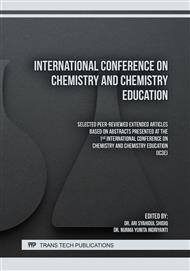[1]
C.P. Gobert, A.M. Duncan. Consumption, Perceptions and Knowledge of Soy among Adults with Type 2 Diabetes. Journal of the American College of Nutrition (2009);28(2):203-218
DOI: 10.1080/07315724.2009.10719772
Google Scholar
[2]
C. Jiang shi, L. Liang fu, Y. Guo wei. Natural products possessing protein tyrosine phosphatase 1B (PTP1B) inhibitory activity found in the last decades. Acta Pharmacol Sin (2012);33(10):1217-1245.
DOI: 10.1038/aps.2012.90
Google Scholar
[3]
M.J. Page, J.E. McKenzie, P.M. Bossuyt, et al. The PRISMA 2020 statement: an updated guideline for reporting systematic reviews. BMJ (2021):n71.
Google Scholar
[4]
J. Belur, L. Tompson, A. Thornton, M. Simon. Interrater Reliability in Systematic Review Methodology: Exploring Variation in Coder Decision-Making. Sociological Methods & Research (2021);50(2):837-865.
DOI: 10.1177/0049124118799372
Google Scholar
[5]
M. Funamoto, K. Shimizu, Y. Sunagawa, et al. Effects of Highly Absorbable Curcumin in Patients with Impaired Glucose Tolerance and Non-Insulin-Dependent Diabetes Mellitus. Journal of Diabetes Research (2019); 2019:1-7.
DOI: 10.1155/2019/8208237
Google Scholar
[6]
A.F.G. Cicero, A. Sahebkar, F. Fogacci, M. Bove, M. Giovannini, C. Borghi. Effects of phytosomal curcumin on anthropometric parameters, insulin resistance, cortisolemia and non-alcoholic fatty liver disease indices: a double-blind, placebo-controlled clinical trial. Eur J Nutr (2020);59(2):477-483.
DOI: 10.1007/s00394-019-01916-7
Google Scholar
[7]
R. Shafabakhsh, Z. Asemi, Z. Reiner, A. Soleimani, E. Aghadavod, F. Bahmani. The Effects of Nano-curcumin on Metabolic Status in Patients With Diabetes on Hemodialysis, a Randomized, Double Blind, Placebo-controlled Trial. Iran J Kidney Dis (2020); 4(4): 290-299.
DOI: 10.1039/c8fo00888d
Google Scholar
[8]
M. Mokhtari, R. Razzaghi, M. Momen‐Heravi. The effects of curcumin intake on wound healing and metabolic status in patients with diabetic foot ulcer: A randomized, double‐blind, placebo‐controlled trial. Phytotherapy Research. 2021;35(4):2099-2107.
DOI: 10.1002/ptr.6957
Google Scholar
[9]
L.X. Na, Y. Li, H.Z. Pan, et al. Curcuminoids exert glucose-lowering effect in type 2 diabetes by decreasing serum free fatty acids: a double-blind, placebo-controlled trial. Mol Nutr Food Res. 2013; 57(9):1569-1577.
DOI: 10.1002/mnfr.201200131
Google Scholar
[10]
S. Asadi, M.S. Gholami, F. Siassi, M. Qorbani, K. Khamoshian, G. Sotoudeh. Nano curcumin supplementation reduced the severity of diabetic sensorimotor polyneuropathy in patients with type 2 diabetes mellitus: A randomized double-blind placebo- controlled clinical trial. Complementary Therapies in Medicine. 2019; 43: 253-260.
DOI: 10.1016/j.ctim.2019.02.014
Google Scholar
[11]
A. Shehzad, T. Ha, F. Subhan, Y.S. Lee. New mechanisms and the anti-inflammatory role of curcumin in obesity and obesity-related metabolic diseases. Eur J Nutr (2011); 50(3):151-161.
DOI: 10.1007/s00394-011-0188-1
Google Scholar
[12]
S. Chuengsamarn, S. Rattanamongkolgul, R. Luechapudiporn, C. Phisalaphong, S. Jirawatnotai. Curcumin Extract for Prevention of Type 2 Diabetes. Diabetes Care (2012);35(11):2121-2127.
DOI: 10.2337/dc12-0116
Google Scholar
[13]
P. Murugan, L. Pari. Influence of Tetrahydrocurcumin on Hepatic and Renal Functional Markers and Protein Levels in Experimental Type 2 Diabetic Rats. Basic Clin Pharmacol Toxicol (2007);101(4):241-245.
DOI: 10.1111/j.1742-7843.2007.00109.x
Google Scholar
[14]
M.A. El-Moselhy, A. Taye, S.S. Sharkawi, S.F.I. El-Sisi, A.F. Ahmed. The antihyperglycemic effect of curcumin in high fat diet fed rats. Role of TNF-α and free fatty acids. Food and Chemical Toxicology (2011);49(5):1129-1140.
DOI: 10.1016/j.fct.2011.02.004
Google Scholar
[15]
M.B. Chougala, J.J. Bhaskar, M.G.R. Rajan, P.V. Salimath. Effect of curcumin and quercetin on lysosomal enzyme activities in streptozotocin-induced diabetic rats. Clinical Nutrition (2012);31(5):749-755.
DOI: 10.1016/j.clnu.2012.02.003
Google Scholar
[16]
N.A. Prabowo, H. Apriningsih. Colchicine reduces the degree of inflammation in COVID-19 patients. IOP Conf Ser: Earth Environ Sci (2021);824(1):012087.
DOI: 10.1088/1755-1315/824/1/012087
Google Scholar
[17]
N.A. Prabowo, R.H. Setyaningrum, H. Apriningsih. Interleukin 6 Associated with Adrenal Insufficiency in COVID-19 Patient. MJMHS (2022):4.
Google Scholar
[18]
N.A. Prabowo, Z.A. Adnan, A. Nurudhin, Y. Werdiningsih, K. Prasetyo. Mesenchymal Stem Cell Conditioned Medium as Good as Methyl Prednisolone in Decreasing Levels of Interleukin 10 and The Degree of Pulmonary Vasculitis in Lupus Mice. Bangladesh J Med Sci (2021); 20(2): 426-430.
DOI: 10.3329/bjms.v20i2.51560
Google Scholar
[19]
N.A. Prabowo, R. Myrtha, H. Apriningsih. Lupus Flares in COVID-19 Patients: A Case Report. MJMHS (2022):3.
Google Scholar
[20]
M. Chanpoo, H. Petchpiboonthai, B. Panyarachun, V. Anupunpisit. Effect of curcumin in the amelioration of pancreatic islets in streptozotocin-induced diabetic mice. J Med Assoc Thai (2010); 93 Suppl 6:S152-159.
Google Scholar
[21]
M.V. Walvekar, N.D. Potphode, S.S. Desai, V.M. Deshmukh. Histological studies on islets of langerhans of pancreas in diabetic mice after curcumin administration. Int J Pharm Clin Res (2016).
Google Scholar
[22]
M.T. Abdel Aziz, M.F. El-Asmar, A.M. Rezq, et al. The effect of a novel curcumin derivative on pancreatic islet regeneration in experimental type-1 diabetes in rats (long term study). Diabetol Metab Syndr (2013);5(1):75.
DOI: 10.1186/1758-5996-5-75
Google Scholar
[23]
R. Ganugula, M. Arora, P. Jaisamut, et al. Nano-curcumin safely prevents streptozotocin-induced inflammation and apoptosis in pancreatic beta cells for effective management of Type 1 diabetes mellitus: nCUR to manage Type 1 diabetes mellitus. British Journal of Pharmacology (2017);174(13):2074-2084.
DOI: 10.1111/bph.13816
Google Scholar
[24]
S. Shome, A.D. Talukdar, M.D. Choudhury, M.K. Bhattacharya, H. Upadhyaya. Curcumin as potential therapeutic natural product: a nanobiotechnological perspective. Journal of Pharmacy and Pharmacology (2016);68(12):1481-1500.
DOI: 10.1111/jphp.12611
Google Scholar
[25]
Y. Zanzer, Â. Batista, A. Dougkas, J. Tovar, Y. Granfeldt, E. Östman. Difficulties in Translating Appetite Sensations Effect of Turmeric-Based Beverage When Given Prior to Isoenergetic Medium- or High-Fat Meals in Healthy Subjects. Nutrients (2019);11(4):736.
DOI: 10.3390/nu11040736
Google Scholar
[26]
M. Kato, S. Nishikawa, A. Ikehata, et al. Curcumin improves glucose tolerance via stimulation of glucagon-like peptide-1 secretion. Mol Nutr Food Res (2017);61(3):1600471.
DOI: 10.1002/mnfr.201600471
Google Scholar



